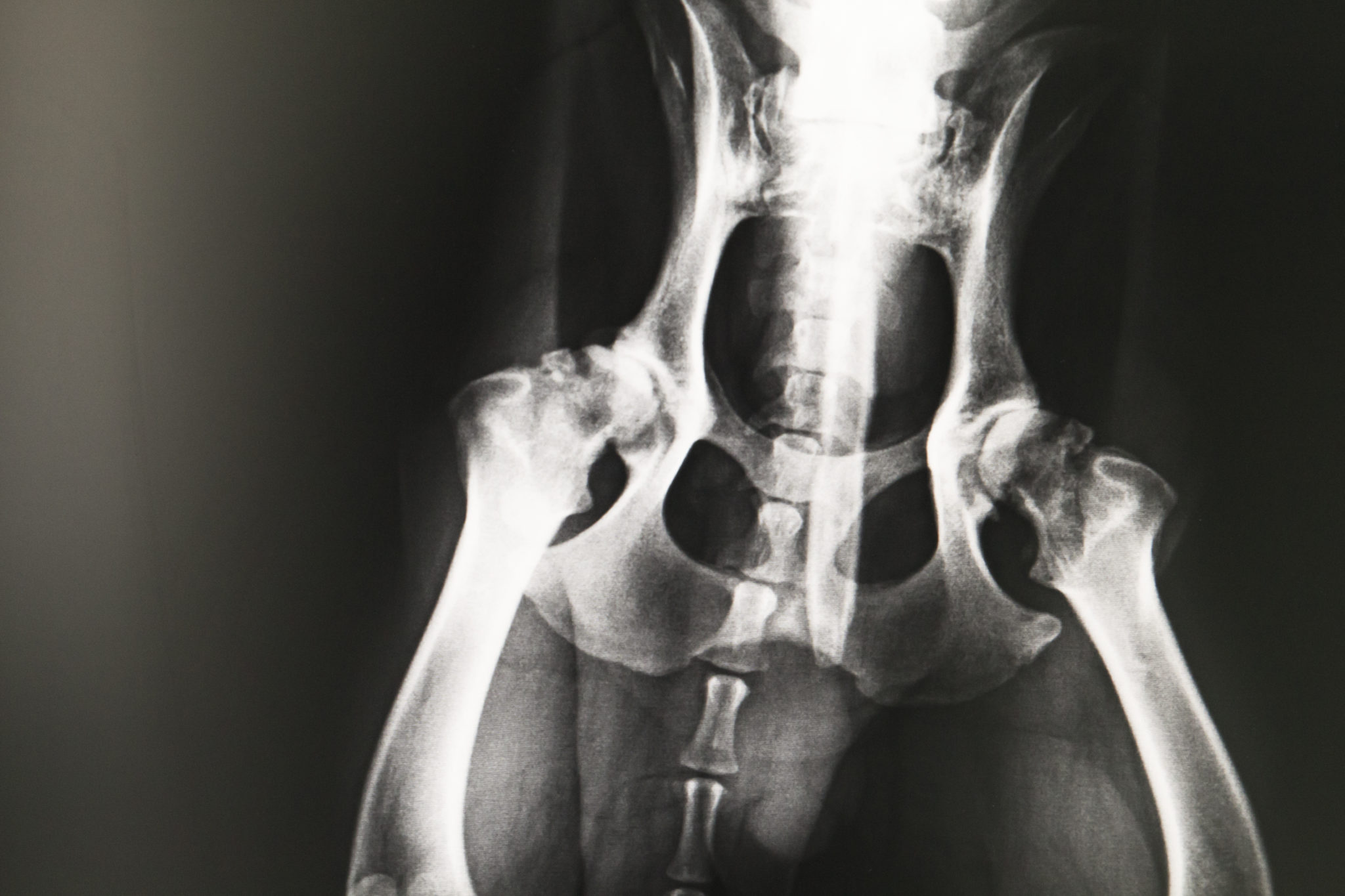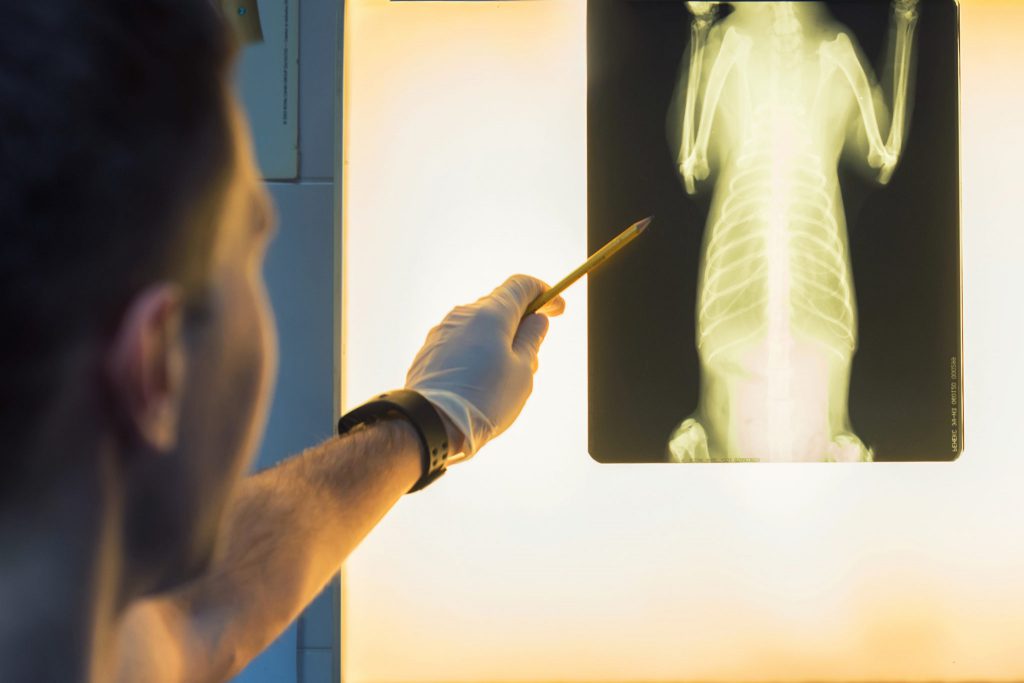
Osteoarthritis (more commonly known as arthritis or degenerative joint disease) is a common condition affecting cartilage of movable joints such as knees, elbows and hips.
The term directly translates to inflammation of joints. Healthy cartilage provides a cushion between bones and is surrounded by joint fluid that allows our bones to glide over one another without friction or pain.

At least 1 in 5 dogs will suffer from arthritis in their lifetime, but this number is likely even higher, particularly in large breed dogs. If your dog is limping and having mobility issues, a likely cause is arthritis but there could be other causes that need to be ruled out by your veterinarian.
History, examination by your veterinarian and x-ray findings assist in making a diagnosis of arthritis. Some dogs will have limping but some will have non-specific signs, such as a change in their temperament, which may include decreased appetite, depression or even aggression.
On physical exam, your veterinarian may note abnormalities such as stiffness, decreased range of motion, soft tissue swelling, muscle atrophy and weight loss. Taking proper x-rays is important. Sometimes other diseases can mimic signs of arthritis, for example, infection, autoimmune diseases or cancer.

The x-rays can show a variety of changes including thickened capsule of a joint, bone spurs, new bone formation, or abnormal joint fluid. The veterinarian may recommend a joint tap procedure to analyze the joint fluid if the findings are not clear.

Many pets will unfortunately be predisposed to getting arthritis, particularly large breed dogs, but there are things that can be done to prevent or slow down the severity of the disease. Keeping your pet at an ideal weight, feeding a balanced diet, and joint supplements has been shown to prevent arthritis.
The ideal body condition of a dog should include being able to easily feel their ribs by lightly touching their sides. When you look down you should see the belly is tucked in, or an hourglass figure. Weight is very influential in preventing your pet from getting serious diseases and living a long time with a good quality of life, just like in people.

Similar to prevention, a joint supplement containing glucosamine is a critical part of both preventing and treating arthritis. Glucosamine is well studied in humans and dogs and shows to improve joint and bone health.
Glucosamine is an amino acid that is naturally produced in the body and is present in many body tissues including joints, tendons and ligaments. It is a component of a molecule called a glycosaminoglycan (GAG) that allows joints to hold a healthy amount of fluid and absorb shock caused by the normal use of joints.
Glucosamine works by stimulating new GAG production to keep the joints healthy. Chondroitin is often contained in a supplement with glucosamine and is also a GAG that works similarly to glucosamine. Fish oil is also used as it reduces inflammation, swelling and pain. All three can be used in combination safely

Many medications may also be used to help with pain associated with arthritis. Your veterinarian may prescribe the use of medications such as non-steroidal anti-inflammatories, opiods and neuropathic pain medications.
These can be very helpful in decreasing inflammation and improving quality of life, often multiple medications can be used together, in conjunction with supplements.

Relatively new to the field of veterinary medicine, physical therapy has also evolved for pets. Use of modalities such as swimming pools, underwater treadmill, electric stimulation (e-stim) and laser therapy has been shown to help with arthritis. Acupuncture, exercises at home, such as range of motion, and massage have also become popular and many dog owners report they have significantly improved mobility.

Ettinger, Stephen J, Edward C Feldman, Bauer, John E. “Nutraceuticals.” Textbook of Veterinary Internal Medicine, 6th ed., Saunders Elsevier, 2010.
Ettinger, Stephen J, Edward C Feldman, Matthews, Karol A. “Nonsteroidal Anti-Inflammatory Analgesics.” Textbook of Veterinary Internal Medicine, 6th ed., Saunders Elsevier, 2010.
“Other Drugs Used to Treat Pain.” Handbook of Veterinary Pain Management, by James S. Gaynor and William W. Muir, 2nd ed., Elsevier, 2015.
Ward, Ernie. “Pet Weight Check.” Association for Pet Obesity Prevention, 2017, petobesityprevention.org/pet-weight-check/
[/et_pb_text][/et_pb_column][/et_pb_row][et_pb_row _builder_version="3.0.72"][et_pb_column type="1_4" _builder_version="3.0.47" parallax="off" parallax_method="on"][et_pb_text _builder_version="3.0.72"] Hip & Joint Supplement
[/et_pb_text][et_pb_image src="https://vetnaturals.com/wp-content/uploads/2017/04/amazon-btn-150.png" url="https://www.amazon.com/Veterinary-Naturals-Hemp-Hips-Inflammation/dp/B01N2S774K/ref=lp_16740413011_1_1?srs=16740413011&ie=UTF8&qid=1506810789&sr=8-1" _builder_version="3.0.72"][/et_pb_image][/et_pb_column][et_pb_column type="1_4" _builder_version="3.0.47" parallax="off" parallax_method="on"][et_pb_text _builder_version="3.0.72"] Probiotic with Skin & Coat Supplement
[/et_pb_text][et_pb_image src="https://vetnaturals.com/wp-content/uploads/2017/04/amazon-btn-150.png" url="https://www.amazon.com/Veterinary-Naturals-Health-Probiotic-Supplement/dp/B06XTBV8SX" _builder_version="3.0.72"]


